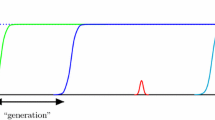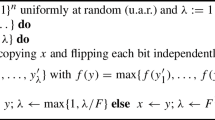Abstract
This paper analyses the behaviour of the (1,λ)-σSA-ES with deterministic two-point rule when applied to a linear problem with a single linear constraint. Equations that describe the single-step behaviour of the strategy are derived and then used to predict the strategy’s multi-step behaviour. The findings suggest that mutative self-adaptation will result in convergence of the (1,λ)-ES to non-stationary points if the angle between the gradient vector of the objective function and the normal vector of the constraint plane is small. Comparisons with the behaviour of evolution strategies that employ other step size adaptation mechanisms are drawn.
Access this chapter
Tax calculation will be finalised at checkout
Purchases are for personal use only
Preview
Unable to display preview. Download preview PDF.
Similar content being viewed by others
References
Arnold, D.V.: Analysis of a repair mechanism for the (1,λ)-ES applied to a simple constrained problem. In: Genetic and Evolutionary Computation Conference — GECCO 2011, pp. 853–860. ACM Press (2011)
Arnold, D.V.: On the behaviour of the (1,λ)-ES for a simple constrained problem. In: Foundations of Genetic Algorithms 11, pp. 15–24. ACM Press (2011)
Arnold, D.V., Brauer, D.: On the Behaviour of the (1+1)-ES for a Simple Constrained Problem. In: Rudolph, G., Jansen, T., Lucas, S., Poloni, C., Beume, N. (eds.) PPSN X. LNCS, vol. 5199, pp. 1–10. Springer, Heidelberg (2008)
Arnold, D.V., MacLeod, A.: Step length adaptation on ridge functions. Evolutionary Computation 16(2), 151–184 (2008)
Bäck, T., Fogel, D.B., Michalewicz, Z.: Handbook of Evolutionary Computation. Oxford University Press (1997)
Beyer, H.-G.: Ein Evolutionsverfahren zur mathematischen Modellierung stationärer Zustände in dynamischen Systemen. PhD thesis, Hochschule für Architektur und Bauwesen, Weimar (1989)
Beyer, H.-G.: Toward a theory of evolution strategies: Self-adaptation. Evolutionary Computation 3(3), 311–347 (1996)
Beyer, H.-G.: The Theory of Evolution Strategies. Springer (2001)
Beyer, H.-G., Schwefel, H.-P.: Evolution strategies — A comprehensive introduction. Natural Computing 1(1), 3–52 (2002)
Hansen, N.: An analysis of mutative σ-self-adaptation on linear fitness functions. Evolutionary Computation 14(3), 255–275 (2006)
Lunacek, M., Whitley, L.D.: Searching for Balance: Understanding Self-adaptation on Ridge Functions. In: Runarsson, T.P., Beyer, H.-G., Burke, E.K., Merelo-Guervós, J.J., Whitley, L.D., Yao, X. (eds.) PPSN IX. LNCS, vol. 4193, pp. 82–91. Springer, Heidelberg (2006)
Meyer-Nieberg, S., Beyer, H.-G.: Mutative Self-adaptation on the Sharp and Parabolic Ridge. In: Stephens, C.R., Toussaint, M., Whitley, L.D., Stadler, P.F. (eds.) FOGA 2007. LNCS, vol. 4436, pp. 70–96. Springer, Heidelberg (2007)
Meyer-Nieberg, S., Beyer, H.-G.: Self-adaptation in Evolutionary Algorithms. In: Lobo, F.G., Lima, C.F., Michalewicz, Z. (eds.) Parameter Setting in Evolutionary Algorithms. SCI, vol. 54, pp. 47–74. Springer, Heidelberg (2007)
Rechenberg, I.: Evolutionsstrategie — Optimierung technischer Systeme nach Prinzipien der biologischen Evolution. Friedrich Frommann Verlag (1973)
Rechenberg, I.: Evolutionsstrategie 94. Friedrich Frommann Verlag (1994)
Schwefel, H.-P.: Numerische Optimierung von Computer-Modellen mittels der Evolutionsstrategie. Birkhäuser Verlag (1977)
Author information
Authors and Affiliations
Editor information
Editors and Affiliations
Rights and permissions
Copyright information
© 2012 Springer-Verlag Berlin Heidelberg
About this paper
Cite this paper
Arnold, D.V. (2012). On the Behaviour of the (1,λ)-σSA-ES for a Constrained Linear Problem. In: Coello, C.A.C., Cutello, V., Deb, K., Forrest, S., Nicosia, G., Pavone, M. (eds) Parallel Problem Solving from Nature - PPSN XII. PPSN 2012. Lecture Notes in Computer Science, vol 7491. Springer, Berlin, Heidelberg. https://doi.org/10.1007/978-3-642-32937-1_9
Download citation
DOI: https://doi.org/10.1007/978-3-642-32937-1_9
Publisher Name: Springer, Berlin, Heidelberg
Print ISBN: 978-3-642-32936-4
Online ISBN: 978-3-642-32937-1
eBook Packages: Computer ScienceComputer Science (R0)




